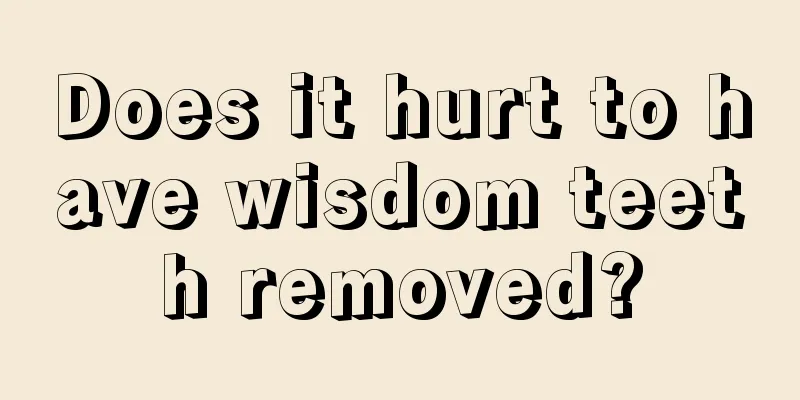Does it hurt to have wisdom teeth removed?

|
Wisdom teeth, also known as wisdom teeth, are the last batch of teeth that people grow, but they have little practical effect and do not contribute much to the function of people's teeth. Instead, they bring a lot of troubles to people. Because wisdom teeth can break the gums and cause inflammation and other disease symptoms, it brings great pain to people. Therefore, removing wisdom teeth is the choice of many people, but does it hurt to remove wisdom teeth? When wisdom teeth need to be removed, a local anesthetic is usually injected before the extraction. There will be no obvious pain during the tooth extraction process. After the tooth is extracted, the extraction site will feel pain. You can take painkillers orally, and usually there will be no obvious pain after 2 to 3 days. Counting backwards from the first tooth in the center of the dentition, the eighth tooth is the wisdom tooth. The food of modern people is becoming more and more refined, the jawbone is not fully developed, the jawbone length is insufficient, and most wisdom teeth cannot fully erupt, or they erupt misplaced, or are completely embedded in the bone. Dentists call these teeth impacted teeth. Due to the abnormal position, direction and height of eruption, wisdom teeth usually do not have the chewing function, and are prone to bite the buccal mucosa and opposing gums, often causing food impaction, inflammation, swelling and pain of the surrounding soft tissues, and leading to destruction of periodontal tissues. Wisdom teeth are located at the back of the mouth, where the space is small and difficult to reach with a toothbrush. The poor hygiene conditions make them prone to caries and also to caries of the adjacent teeth in front. When the jaw is not fully developed and there is not enough space, the wisdom teeth will forcefully erupt and squeeze the front teeth, sometimes causing unexplained pain. It can also cause the roots of the front teeth to be compressed and absorbed, and even cause the front teeth to twist, aggravating the malocclusion. The abnormal eruption position, height, and direction of wisdom teeth interfere with the normal movement of the jaw during chewing, causing abnormal forces on the chewing muscles and temporomandibular joints, causing spasms and pain in the related muscles. Over time, this can lead to dysfunction of the temporomandibular joint and even pathological changes in the joint structure. Due to the possible problems mentioned above, in order to protect oral health, dentists often recommend removing wisdom teeth to prevent them from causing damage to other teeth and tissues. Of course, wisdom teeth that erupt normally and have chewing function should be retained and protected. In addition, completely impacted wisdom teeth that have no symptoms can also be retained. However, the presence of wisdom teeth reduces the fracture resistance of the mandible. For people who engage in acrobatics or intense contact sports, in order to prevent mandibular fractures, it is best to remove completely impacted wisdom teeth in advance. |
<<: Sore throat after tooth extraction
>>: Can babies' shrimp allergies heal themselves?
Recommend
What causes a lump in the inner thigh groin?
The thigh muscles are well developed and have mor...
What does a water purifier do?
Many households now have water purifiers installe...
Which is harder to treat, esophageal cancer or laryngeal cancer
If you often stay up late or do not develop good ...
What are the early symptoms of liver cancer? Beware of liver cancer if you notice these three symptoms when you wake up
The liver is one of the most important organs for...
The difference between an air fryer and an oven
Many homes have air fryers and ovens, but people ...
What are the methods to check fibroids
Although fibroids are a frightening disease, ther...
The most important early symptoms of colorectal cancer in daily life
Among cancer diseases, colorectal cancer is the m...
What to do if you have a flat chest and breastfeed
Because of differences in growth hormone and gene...
Is abdominal tuberculosis serious?
Abdominal tuberculosis actually refers to the pre...
What are antibodies? The role of antibodies
Antibodies play a vital role in the human body, a...
How can patients with liver cancer predict recurrence and metastasis? These three measures should be taken to prevent liver cancer
The main characteristics of cancer cells are that...
Uncovering the treatment methods for rectal tumors
Many patients or relatives who suffer from rectal...
What are the effects of baking soda
We have heard a lot about soda. Soda is edible, s...
Can teeth that have shifted recover on their own?
Displaced teeth generally cannot recover on their...
What is the difference between a tube top and a breast wrap
Fashion trends always lead people's lives. Wi...









